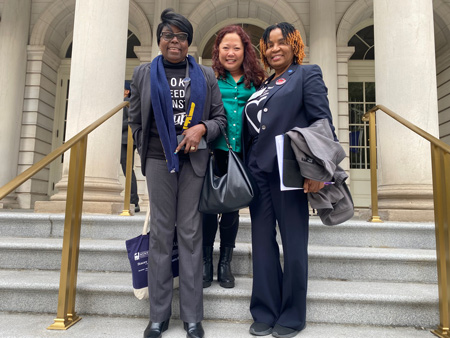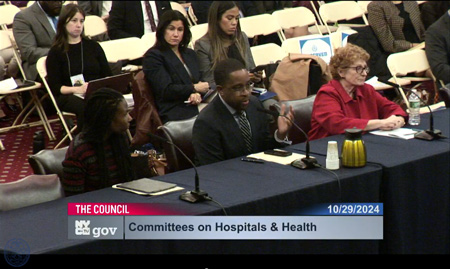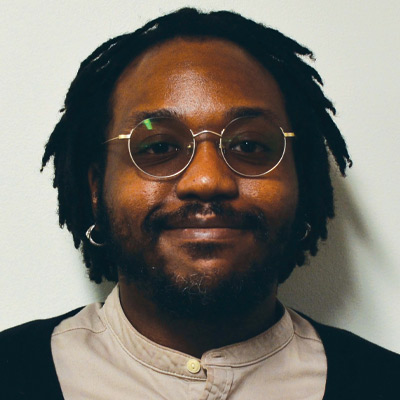
November 25, 2024 — The campaign to save SUNY Downstate is nearly a year old, and although PEF, other unions and members of the NYC clergy have worked to halt its immediate closure, the future of community hospitals like Downstate are still unclear. That’s why the New York City Council held a joint hearing on Oct. 29 with the Committee on Hospitals and the Committee on Health to hear concerns and find solutions.

Committee Chairs Mercedes Narcisse and Lynn Schulman delivered opening statements that welcomed participating panelists while also calling out government officials who have made the decision to close hospitals like SUNY Downstate without recognizing the impact on communities.
Councilmember Narcisse is a registered nurse who has worked in Central Brooklyn, and whose son attended SUNY Downstate’s Medical School.
“As a city council, we must consider the needs of the surrounding communities that would be disrupted by closures,” said Councilmember Narcisse. “And to ensure that everyone has access to high quality healthcare.”
Hospital closures in New York City happen all the time, according to Councilmember Schulman, with about 20 percent of closures occurring between 2003 and 2014. The state has been working to close “unprofitable” hospitals since 2005 after the findings of the Berger Commission recommended ways to save healthcare costs. Councilmember Schulman stressed that closing hospitals in that way helps no one.
“That mentality is unacceptable today,” said Councilmember Schulman. “And we will not allow that mentality to be the leading voice of this city or state.”
Dr. Michelle Morse is the Interim Health Commissioner at the New York City Department of Health. She and Chief Medical Officer for Elmhurst Hospital, Dr. Laura Iavicoli, presented on behalf of NYC DOH.
Dr. Morse said that currently Kings County Hospital is one of the busiest hospitals and emergency rooms in the state and that while she cannot predict the full impact that a SUNY Downstate closure would have, she can safely say that Kings County – located just down the street in Brooklyn — will be affected.
“Were SUNY Downstate to close, we don’t need a study to tell us the ripple effects,” said Dr. Morse. “The State Department of Health is responsible for planning, in partnership with any hospital that closes, to mitigate any impact on the community that uses that hospital.”
SUNY Downstate has the only kidney transplant program in the borough of Brooklyn. During the hearing, Councilmember Narcisse expressed concern that patients would not be able to receive this kind of life-saving care at other hospitals within the NYC DOH system.
“Health and Hospitals does not have a kidney transplant program,” said Dr. Iavicoli.
Dr. Morse described the inability to access specialty care only found at SUNY Downstate, like kidney transplants, as a critical health equity issue for Brooklyn.
“This is certainly a serious health equity issue. Access to kidney transplants is a major challenge in the city at baseline,” said Dr. Morse. “As far as we’re aware, the SUNY Downstate kidney transplant program has transplanted over 3,000 people in the Brooklyn area since it was established.”

Also present at the hearing were State Assemblymember Jo Anne Simon and State Senator Zelnor Myrie, who both represent districts in Brooklyn. Simon said the way the state makes decisions on closures does not make sense, which is why she introduced the “Local Input in Community Healthcare,” or LICH Act.
“This bill passed in both houses and is borne out of my experience as a community leader when Long Island College Hospital was closed in 2013,” said Assemblymember Simon. “I have been fighting ever since that time to make hospital closures make sense.”
Senator Myrie has co-sponsored the LICH Act. He said that his community is in danger and that SUNY Downstate, a hospital that helped save the community during the height of the COVID pandemic, deserves better than a misguided proposal.
“The proposal included a ‘public outreach process’ that was rushed, opaque and wholly insufficient. There were closed-door, invitation-only, focus groups and a last-minute report, thrown together, that summarized its pre-ordained conclusion,” said Myrie. “It was frankly an insult against my community, and I am proud that we mobilized to fight back against this plan.”
Joan Rosegreen a PEF Executive Board Member and Registered Nurse at SUNY Downstate for more than 20 years, also spoke at the hearing. She told the council that she knows that the closure of the hospital will hurt the community which has a high incident of diabetes, kidney failure, heart failure and other high-risk illnesses.”
Rosegreen also told the council that this potential closure would affect her own family.
“My mother, as I am speaking to you here now, is a patient at the hospital. I use the hospital for my entire family and have had my own treatment there,” said Rosegreen.
In addition to offering services like pediatric dialysis, Rosegreen called SUNY Downstate the “epicenter” teaching hospital that produces diverse graduates who go on to become high quality doctors serving the community.
“The closure of this hospital, which produces 90% of the doctors serving in this community, and minority doctors, is going to be impacted tremendously for the neighborhood in and around,” said Rosegreen. “There is no resource for these people to travel to the city for their care.”
Rosegreen and the other panelists all agreed, like the campaign slogan says, that “Brooklyn Needs Downstate!” On Nov. 25, 2024, Governor Kathy Hochul appointed an advisory panel to study the future of SUNY Downstate. The panel will hold public hearings and recommend a “reasonable, scalable, and fiscally responsible plan for the financial health, viability, and sustainability of SUNY Downstate Hospital and SUNY Downstate Health Sciences University”by April 1, 2025. PEF and the rest of the “Brooklyn Needs Downstate” coalition plan to keep the pressure on and demand real results in the months ahead.

